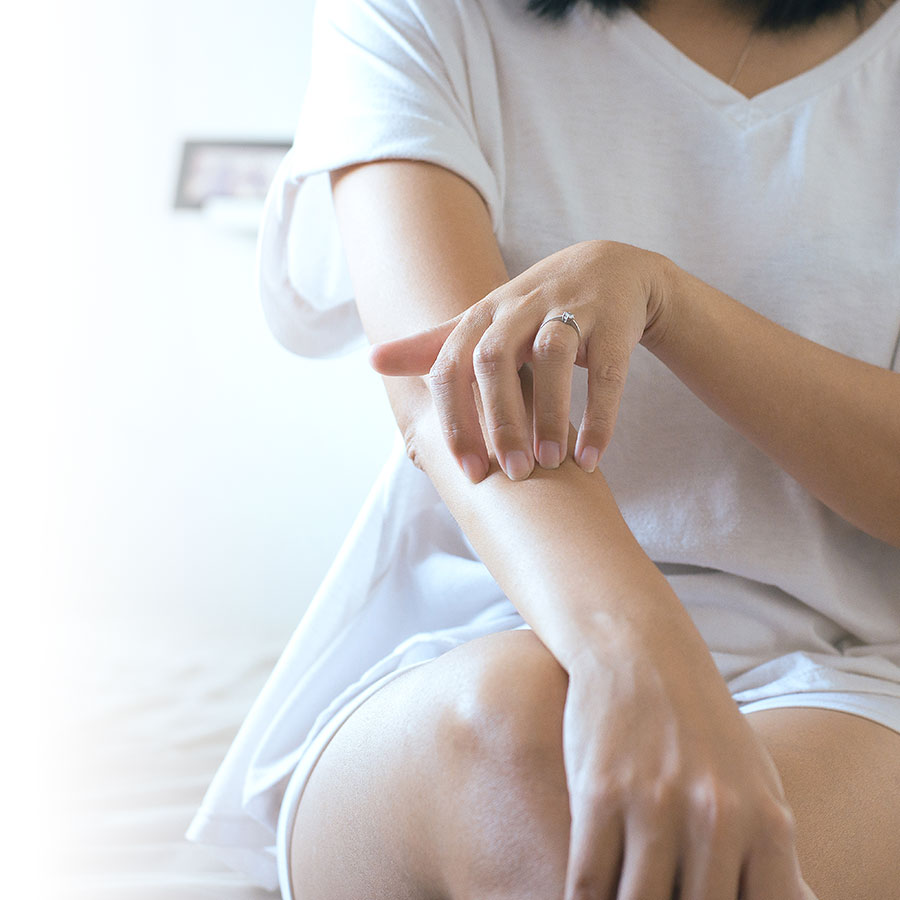When it comes to eczema, prevention is the watchword! Here is an overview of the appropriate actions to take and the care that should be provided.
What is eczema?
Eczema is a chronic and recurring skin condition characterized by dryness, itching, redness and irritation. There are several types of eczema; the most common one is called atopic dermatitis. This condition is often observed in young children and individuals who suffer from or have a family history of allergies and asthma.
Heredity plays a major role in the predisposition to eczema. Aside from this predominant factor, the following elements can also promote the onset of atopic dermatitis:
— contact with substances that cause intolerances or allergies (animal hair, mites, dust, foods, soaps, chemicals, etc.)
— wind, the cold and extreme temperatures
— stress
— smoking or exposure to second-hand smoke
Individuals with very dry skin may or may not develop eczema. Dry skin should also be treated with care
What are the basic principles of eczema management?
If atopic dermatitis is present, the entire surface of the skin requires special care and not only the affected areas. Management depends on the following elements:
— reduction or elimination of triggers or aggressors
— gentle skin cleansing using the appropriate products
— optimal skin hydration, and
— treatment of affected areas
Daily application of a quality moisturizer is the best way to prevent dry, irritated and eczematous skin. Moisturizers trap water beneath the skin, making it flexible and less likely to crack. It is important to choose a product that is adapted to the particular needs of very sensitive skin, and that includes the following characteristics:
— is unscented
— does not contain superfluous or irritating ingredients
— is pH balanced
— is hypoallergenic
— offers effective and long-lasting skin hydration
These measures alone are not always enough to control eczema. The use of medication is sometimes necessary. Some prescription or over-the-counter medications can sometimes help. Ask your pharmacist to provide information on the options available to you.
What measures help to prevent and treat eczema?
In addition to the basic care described above, the following measures also help to maintain healthy skin.
- Avoid exposure to substances that can trigger or aggravate eczema.
- Keep the temperature and humidity in your home stable. Avoid extreme temperatures. Consider purchasing a humidifier if needed.
- Wear clothing that lets your skin breathe and avoid abrasive fabrics
- Take warm baths or showers for a maximum of five minutes.
- After bathing, pat your skin dry with a soft towel. Avoid vigorously rubbing the skin.
- Avoid scratching affected areas. Wear cotton gloves at night if needed. Keep children's nails cut short.
- Protect your skin from the sun. Overexposure to the sun dries out and damages skin. Some individuals may have the impression that their skin has improved, but these positive effects are probably associated with the temperate climate of the summer, which is easier on the skin than our dry, windy winters.
- Quit smoking. Your pharmacist can help you to succeed.
- Reduce stress and learn to better manage it.


